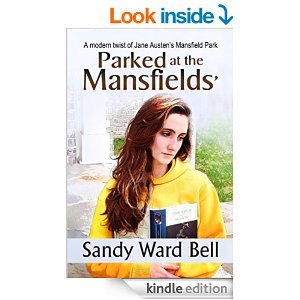INTERVIEW WITH SANDY WARD BELL, AUTHOR OF PARKED AT THE MANSFIELDS’
12/4/14 – INTERVIEW WITH SANDY WARD BELL, AUTHOR OF PARKED AT THE MANSFIELDS’
In The Jane Austen Persuasion, I wondered how Jane Austen could be widely idolized by so many readers and yet at the same time dismissed, even despised, by other equally thoughtful, literate people. So I was delighted to have a chance to interview Sandy Ward Bell. As the author of Parked at the Mansfields’, a modern twist on Jane Austen’s Mansfield Park, I figured she could shed considerable light on this question, and I wasn’t disappointed.
TZ: I have a sneaking suspicion that Mansfield Park is your favorite Jane Austen novel – or at least a greatly beloved one. What most appeals to you about it, and why?
SWB: Even though each one of Austen’s masterpieces has a special place in my heart, Mansfield Park is my favorite. My love for this story revolves around the protagonist, Fanny Price, a tenderhearted girl always trying to do the right thing. She’s not a popular character amongst Janeites because Fanny refused to break the rules. I believe there is a boring abundance of rebellious main characters in the novel world, so Fanny stands out like a beacon. She attempts to do the right thing all the time and, for me, that is “cool.” It is harder to be a good person than it is to be a bad one. She embodies the strength to be the woman she wants to be even though those around her call her a dullard and self-righteous. What blows me away is that Austen wrote about young people growing up in 1814, and those people can easily live in 2014.
TZ: What gave you the idea of retelling the story with a modern twist? And would you consider doing the same for another Jane Austen work?
SWB: I always felt like Mansfield Park got a bad rap and thought if I set this wonderful protagonist in the middle of today’s world, maybe I could change a few minds as well as introduce this story to those who have never read Austen. I also added a few extra characters and a couple of mysteries to keep it fresh for Austen fans and to entertain those who need more than a romance.
I have already been asked to consider modernizing another Austen novel, so the idea is floating around in my head. No promises, but both Persuasion and Northanger Abbey are interesting possibilities.
TZ: Parked at the Mansfields’ is billed as keeping the “heart and spirit” of Jane Austen’s original novel, as well closely paralleling the original plot. Instead of satirizing 18th century English gentry, it satirizes affluent American suburbanites, with Fanny becoming Franny and three sisters from different social strata in Regency England become three socially diverse Americans. Were there any parts of the original book particular difficult to translate into modern-day America?
SWB: I really enjoyed changing horses into Vespa scooters and having a laudanum user become a coffee addict. Yet, there were a few times when I had to make tough decisions and leave out important Austen scenes because they wouldn’t fit into the story I created. For example, Austen has Fanny go back to live with her parents for a while, and I couldn’t do that with my Franny because her father disappeared, there was no home to go back to, so she went to Penn State instead. Also, in today’s world, it would not be scandalous to put on a play in your home. I didn’t want my Franny and her friends to be filming a porno, so I had them throw a kegger party. Yet, I kept the play theme by having them attend a performance and getting there is where the drama begins.
 TZ: One of the Amazon reviewers thought this book would appeal both to Jane Austen fans and to young adult readers. This strikes me as a pretty wide, and diverse, net, especially because I suspect many young adult readers have never heard of, much less read Mansfield Park, and perhaps not even Jane Austen. How important is it for readers to know the original book to enjoy Parked at the Mansfields’?
TZ: One of the Amazon reviewers thought this book would appeal both to Jane Austen fans and to young adult readers. This strikes me as a pretty wide, and diverse, net, especially because I suspect many young adult readers have never heard of, much less read Mansfield Park, and perhaps not even Jane Austen. How important is it for readers to know the original book to enjoy Parked at the Mansfields’?
SWB: It isn’t important at all. My story stands alone without any knowledge of Mansfield Park. My hope is that a young reader will enjoy mine and become inspired to read Austen’s version of the same tale. And I’m confident once they get a taste of Austen they will want to read more. I believe the reviewer was referring to Franny’s age; the story explores her life from ten to twenty-one, so readers those ages will relate quite easily.
TZ: Why do you think many modern readers almost worship Jane Austen, pegging her as one of the greatest novelists of all time, while other readers, even literate and well-educated ones, find her unreadable? I raised this question in The Jane Austen Persuasion, and I’m hoping you can solve the mystery!
SWB: Great question. The logical answer to why Austen is loved by so many is that she had a way of creating a timeless story that was full of love, passion, wit, and fascinating characters. The emotional answer to that same question is that Austen had a gift of putting the right words together to make the reader feel alive while sitting next to Fanny Price and Anne Elliot and Elizabeth Bennet as they conversed with villains and lovers. Not many writers can evoke feelings of love and hate like Austen can.
To get to know Austen better, I read one of her favorite authors, Frances Burney. Evelina was a good story, but it wasn’t as compelling; it didn’t have the humor and snide comments that Austen did so well. Even in her day, it seems she had this magical ability to make a reader fall in love with her characters and plots.
For those that find Austen unreadable, I think they have trouble with romantic stories so they won’t give it a chance, and I was one of those people. I laugh out loud at the absurd sweetness of Nicholas Sparks books; I can’t get through his work. The difference with Austen is there is no sugar. It is overflowing with delightful characters and witty dialogue. I also believe some people have trouble with the time period. In the 1800’s, women couldn’t own land or have a career or vote so of course their only goal in life was to find the perfect mate. To some, I think that is where they become stuck and can’t relate to someone with only one ambition. For me, that is the fascinating part; Austen always makes the best out of a bad situation.
The mystery may or may not be solved, but I’ve attempted to add more interest to the debate.
Sandy Ward Bell is a novelist and former radio announcer and promotion director who lives in Nashville, TN. Her debut novel, In Zoey’s Head, reflects her experience with the media and pop culture, while her second book, Parked at the Mansfields’, highlights her appreciation for Jane Austen’s timeless story.
Terra Ziporyn
TERRA ZIPORYN is an award-winning novelist, playwright, and science writer whose numerous popular health and medical publications include The New Harvard Guide to Women’s Health, Nameless Diseases, and Alternative Medicine for Dummies. Her novels include Do Not Go Gentle, The Bliss of Solitude, and Time’s Fool, which in 2008 was awarded first prize for historical fiction by the Maryland Writers Association. Terra has participated in both the Bread Loaf Writers Conference and the Old Chatham Writers Conference and for many years was a member of Theatre Building Chicago’s Writers Workshop (New Tuners). A former associate editor of the Journal of the American Medical Association (JAMA), she has a PhD in the history of science and medicine from the University of Chicago and a BA in both history and biology from Yale University, where she also studied playwriting with Ted Tally. Her latest novel, Permanent Makeup, is available in paperback and as a Kindle Select Book.
- Web |
- More Posts(106)